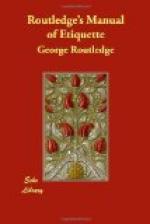The banns must be publicly read on three successive Sundays in the church, after the last of which, if they so choose, the happy pair may, on the Monday following, be “made one.” It is usual to give one day’s previous notice to the clerk; but this is not legally necessary, it being the care of the Church, as well as the policy of the Law, to throw as few impediments as possible in the way of marriage, of which the one main fact of a consent to live together, declared publicly before an assemblage of relatives, friends, and neighbours (and afterwards, as it were by legal deduction, before witnesses), is the essential and constituent element. Marriage by banns, except in the country districts, is usually confined to the humbler classes of society. This is to be regretted, inasmuch as it is a more deliberate and solemn declaration, and leaves the ceremony more free from the imputation of suddenness, contrivance, or fraud, than any other form. A marriage by banns, it is understood, can never be set aside by the after discovery of deception or concealment as respects residence, and even names, on either side. The fees of a marriage by banns vary from 11s. 6d. to 13s. 6d. and 15s. 6d., according to the parish or district wherein the marriage may take place.
Hours in which Marriages may be Celebrated.
All marriages at church must be celebrated within canonical hours—that is, between the hours of eight and twelve, except in the case of special licence, when the marriage may be celebrated at any hour, or at any “meet and proper place.”
Marriage by Special Licence.
By the Statute of 23rd Henry VIII., the Archbishop of Canterbury has power to grant special licences; but in a certain sense these are limited. His Grace restricts his authority to Peers and Peeresses in their own right, to their sons and daughters, to Dowager Peeresses, to Privy Councillors, to Judges of the Courts at Westminster, to Baronets and Knights, and to Members of Parliament; and, by an order of a former Prelate, to no other person is a special licence to be given, unless they allege very strong and weighty reasons for such indulgence, arising from particular circumstances of the case, the truth of which must be proved to the satisfaction of the Archbishop.
The application for a special licence is to be made to his Grace through the proctor of the parties, who, having first ascertained names and particulars, will wait upon his Grace for his fiat.
The expense of a special licence is about twenty-eight or thirty guineas, whereas that of an ordinary licence is but two guineas and a half; or three guineas where the gentleman or lady, or both, are minors.
Marriage by Licence.
An ordinary marriage licence is to be obtained at the Faculty Registry, or Vicar-General’s Office, or Diocesan Registry Office of the Archbishops or Bishops, either in the country, or at Doctors’ Commons, or by applying to a proctor. A licence from Doctors’ Commons, unlike others, however, is available throughout the whole of England.




